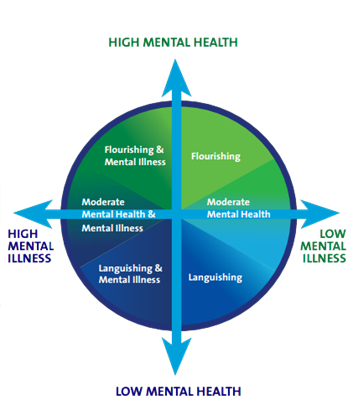Feeling ‘meh’ to the ‘bleh’? You might be languishing, here’s what it is and how to combat it.
It’s been a super tough few years. For those of us that have been trying to keep going despite it all, many have started to feel deflated. If you’ve recently been feeling ‘meh’, so-so, ‘shrug-shoulders’ ok, you may be experiencing a term called languishing. Let’s explore what it is and ways to address it.
The Beginning of ‘Languishing’
The term ‘languishing’ was coined by US Sociologist Corey Keyes. He came up with a term that encompassed what he had been seeing, “the absence of mental health”.
Keyes and current psychologists don’t consider ‘languishing’ as a mental illness, rather, as an overarching symptom and reaction to a “significant psychosocial impairment in terms of perceived emotional health, limitations of activities of daily living and workdays lost or cutback”.
If those components strike you as familiar, you’re not alone. With COVID touching on all of those areas, many mental health experts now seek to identify, help and guide through ‘languishing’.
What is ‘Languishing’
Languishing is the feeling of being hollow and stuck in a rut. You may be able to keep things going in your life but there’s no spark in doing so.
The mental health continuum can be a helpful way of understanding languishing and how it differs from mental illness. As can be seen in the model below, languishing is a state where someone might experience low mental health, in the absence of mental illness.
Those experiencing languishing may not be aware they are going through it. Experts say reaching a zone of languishing is more of an incremental process compared to someone who is flourishing and then finds themselves navigating depression.

There are multiple components of languishing which may include:
- Feeling without aim or purpose
- A significant downturn or lack in motivation
- Feeling lethargic and tired
- Having the spark go out of activities you once enjoyed
- Struggling to focus and stay on task
How to Cope With Languishing
Dealing with your mental health is never a quick fix, but there are some actionable steps you can take to cope with languishing.
‘Flow’ Theory
There isn’t one overarching solution for languishing and different approaches are going to work for different people. Be encouraged however, that if one approach doesn’t work, there may be many others that could.
An approach that is gaining traction in the world of psychology is Flow theory - that of searching for an attitude of ‘flow’.
Flow Theory was introduced in the 70s by psychologist Mihaly Csikszentmihalyi. He studied a host of professions and people, namely artists, writers and athletes, who immersed themselves in activities, even without the guarantee of money or fame.
What surprised him the most was that enjoyment didn’t come from unwinding or avoiding stress but rather from focused activities where the attention was completely engaged.
Those in the study were fueled through the quality of the experience they undertook while fully immersed on the task. Even if the activity was out of their skill-set, challenging and had a degree of risk, people described being energised by their capacity and skills being stretched.
‘Flow’ Theory and Combatting Languishing
What psychologists have taken from Flow theory is that a person can aim to be captivated in an activity where they can lose track of where they are and how much time has passed. This immersion has been shown to assist with rising levels of creativity, output and has been linked to increased wellbeing.
Many activities have been shown to have the potential of facilitating the ‘flow’, whether painting, dancing, cooking or learning a new instrument. Even stationary tasks have been proven to be mesmerising, from doing a puzzle to picking up a new book. It’s about providing yourself with the space to try and get into the ‘flow’.
Start Small
For many experiencing languishing, motivation and focus can be hard to come by. This can make it challenging to reaching a level of engaged ‘flow’. It is normal to at first experience difficulty when first trying ‘flow’ theory, which is why it’s important to start small and varied.
Instead of hoping for motivation to break through, start bite-sized and across an array of activities. This approach is an accessible and palatable way to gently ease in and assess if any of the activities you try can lift your sense of purpose, motivation and mood.
A List of Your Favourite Things
Psychologists encourage that when starting out, pick activities and areas that you have found or are likely to find intriguing. Starting an activity is made much easier when motivation and enjoyment are closer to the surface.
Aligning the activities you try to those you are passionate and motivated by, while also providing a degree of difficulty and challenge, means that your brain is more likely to be stimulated and engaged.
It is also helpful not to try out something that is too out of your comfort zone, where the difficulty may likely prevent you from continuing.
As we are all different, varying approaches will suit different people. Finding an activity that works for you may take time, patience and kindness towards yourself. Remember to remind yourself of this as you start your flow journey.
If you’re struggling with your mental health our expert psychologists at PeopleSense by Altius Group can help. We accept referrals through Mental health Care Plans, self-fund requests from the public and provide confidential counselling services for employees through our EAP program. To find out more contact us online or call 1800 258 487.






